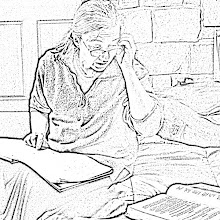In Haiti, 16-year-old Charlene resorts to eating dirt to fill her belly.
Bai was married at five to a 36-year-old, and widowed by nine. She spent her entire life begging for a living. In India, widows do not remarry; their very presence is considered inauspicious, so they are shunned by society. Even when they are nine.
Forced from his home in Sierra Leone at 12, taught to maim and to kill at 13, Ishmael is just one of the world’s estimated 300,000 child soldiers. The atrocities he lived through – and was forced to commit – are hard for us to imagine.
Kamala was cursed at birth for being born a girl. As she grew up, she was constantly reminded that she was a financial drain on her family. The sooner she was married off, the better. But marriage requires a dowry, something Kamala’s family couldn’t afford, so when she was 12, they sold her into prostitution in Bombay instead.
Mende was kidnapped from her village in southern Sudan and sold by her captors into slavery to an abusive Arab family in Khartoum. What she endured at the hands of her masters was beyond cruelty.
These are just some of the stories I’ve read. No, they aren’t tales from history books, but events that are going right now as I sit in my comfortable home. People are eating dirt while I eat ice cream. Widows are ostracized, children are conscripted as soldiers, girls are sold into prostitution, youngsters are kidnapped and sold into slavery.
My heart breaks when I read these accounts. But there’s more, much more.
Lawlessness in Somalia, which hasn’t had a central government for 17 years.
Desperate laborers lured to sell their kidneys.
Leprosy. Yes, today.
Christians thrown in jail and tortured.
Children sold like commodities by desperately poor parents.
I read, and I weep. I want my children to weep, too. I want them to be aware of these atrocities, these injustices, these horrors. Only in this way can they, like I, be moved to action, whether it’s to donate funds to help the oppressed, speak out for them, lend a hand during a mission trip, or devote their entire lives to making a difference.
How will my kids learn unless I teach them?
So next year, I will introduce a new subject into my homeschool curriculum. I’ll call it Heartache.
Once a week, we’ll learn about child soldiers. Street children. AIDS orphans. Those who dig through trash to eek out an existence. And who better to teach my children than I?
I fed the street children in Addis Ababa.
I hugged the orphans in Honduras.
I befriended a woman who digs through trash in a Mexican landfill.
I played with the AIDS orphans in Ethiopia.
I had my heart broken by the starving children in a Kenyan widow’s home.
I saw countless thousands of people sleeping on the streets of Calcutta.
I visited a fistula clinic where women with childbirth injuries are repaired, sometimes after years or decades of suffering.
But I didn’t even touch the tip of the iceberg of the world’s suffering. How can I possibly convey it to my children?
Maybe, God willing, I’ll at least touch a heart.







